It would be easy to read The Queen’s Gambit in terms of a simple narrative style that has a long history: a protagonist with troubled beginnings rises to great heights only to stumble and fall, facing a challenge that at times seems insurmountable, only to eventually overcome it in the final act. And, of course, The Queen’s Gambit is such a story, but its strength lies in the extent to which it recognizes that the obstacle here—Beth’s struggle with addiction—is not fully surpassed and left behind. Never does The Queen’s Gambit pretend that she has fully conquered her problems. Even if the show does feature the played out trope of her tossing her pills in the toilet, it’s not given the weight of some ultimate moment of determination that allows her to enter onto an unproblematic future (and also people do throw their pills in the toilet, even though this is something that you really should not do). On the contrary, she tells Townes later that she’s inquired about how to find replacements.
And so while The Queen’s Gambit ends in Beth’s triumph, it should be clear that there is no happily ever after here. I hope, and am sure you hope as well, that Beth will go on to have a happy life, whatever that means. But it would be a mistake to think that the game is over. The Queen’s Gambit is Beth’s opening, and not her endgame no matter what the episode titles might tell us.
She’s won the world championship…now what? She asks this very question as she talks to the young Russian who wants to see an Elvis movie at the drive-in. Of course he intends to win even younger than she ultimately does, but this is not to the point. In a meaningful sense, Beth Harmon has her entire life ahead of her at the end of The Queen’s Gambit. Plenty of time remains for her to spiral out again. I’m not predicting that she will, and I am certainly hoping that she won’t as I imagine her life after the events that form the series, but what happened in Paris should not be forgotten. There is a reason The Queen’s Gambit opens with this scene and circles back to it—herein lies the crux of Harmon’s existential dilemma.
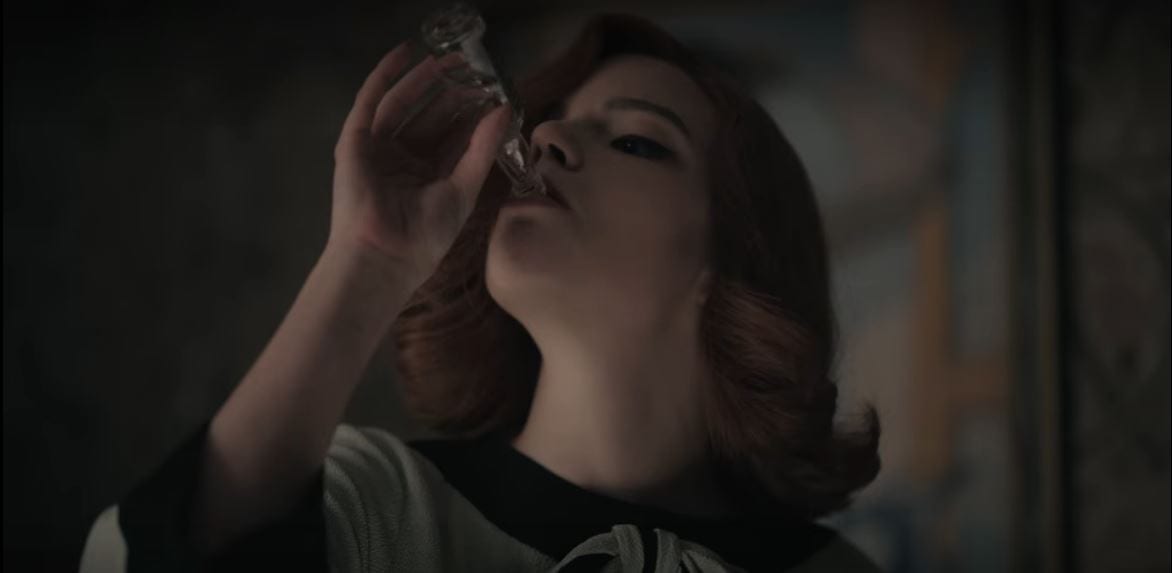
What first appealed to her about chess was the board: 64 squares—something she could control. Beth’s life had up to that point been one of chaos. Of course all of our lives are lives of chaos—more on that presently—but Beth Harmon’s in particular had been full in her early years with a problematic upbringing that culminated in a car wreck that killed her mother and landed her in an orphanage. Worse, it wasn’t an accident. Beth always knew it wasn’t an accident in the same way that she always knew her father was still out there. But he didn’t care, so f*ck him.
Yet we should be careful when it comes to the temptation to blame issues of addiction on external causes. This is not to say these aspects of her life aren’t contributing factors for Beth—certainly they are—but merely to point out the potential trap involved in thinking that her issues could have been avoided “if only…”
Perhaps they could have been. Not everyone is an addict, after all, but there is a structure of addiction that gets at something existential. Life is chaos insofar as there is no overarching narrative. We search for that kind of narrative as something to provide not only order to our lives but a sense of justification. One could follow someone like Leibniz, say “everything happens for a reason” and mean it. But what is the reason for existing itself? One might flounder in attempts to offer an answer. You could believe in theodicy (whether Leibniz’s version of it or another) and hold that everything is justified by God, but insofar as that God is absent what justifies the belief itself? Faith in justice can easily devolve into dogmatic adherence to dictum…theodicy into the structure of addiction. Not that religion ever seems to have held much appeal for Beth herself.
Central is the desire for order. Beth is addicted to chess as much as to tranquilizers. So it would be wrong to blame the substance, though it is perhaps the desire for substance, or something of substance—something substantial to give existence meaning—that is at play.
But there is nothing, or the same thing over and over again—that feeling staring at the ceiling as pieces move on an imaginary board: a feeling of calm and the discovery of an order of things. And it’s analogous with the drinking, searching for the world at the bottom of a bottle, after that fulfillment that never quite comes. So you do it again.
The structure of addiction may be problematic in itself, but it would be far too simple to think that all addictions are “bad.” If Beth is addicted to chess, for example, I would even argue that this is good—not the addiction, but the chess. And the same goes in other areas, from Isaac Asimov’s apparent obsession with writing to the way that others are addicted to exercise. Of course, there may be health problems, whether physical, mental or both. And any addiction may wreak havoc on interpersonal relationships. But then, what do we want out of life? What should we want? To paraphrase Marc Maron, the non-addict perhaps doesn’t know what it is like to really want something and get it…over and over and over again.
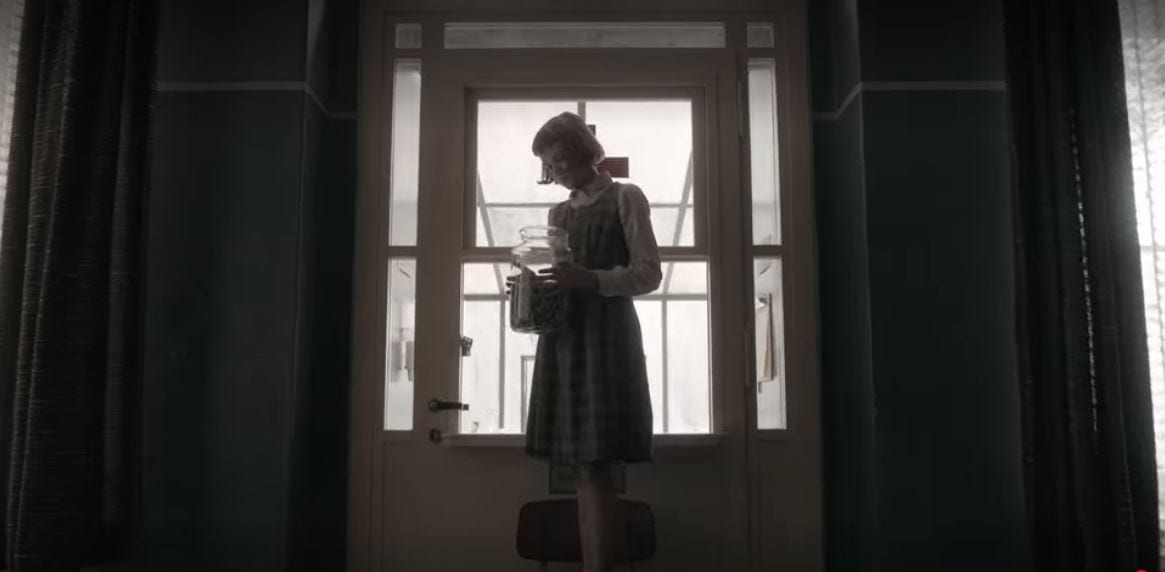
Beth knows that she won’t just have one drink when she goes to meet Cleo in Paris. At some level she knows that this is not how it works for her. She’s the little girl who shoved handfuls of pills into her mouth after breaking into orphanage’s dispensary after all. But that doesn’t stop her from trying to deny this. She tries to exert this level of control over herself, but this is where she is bound to fail. It’s not the alcohol’s fault—booze isn’t magic—but it isn’t quite hers either as she moves from telling herself it will just be one drink to believing it will be OK if she has more (she’s having such a good time!) to deciding half-drunk that it doesn’t matter. Nothing matters, so clearly that includes chess.
Which is correct, actually. There is no grand justification for your life, or mine, or Beth’s. Or if there is it isn’t available to us. Chess is beautiful, as is Beth’s mind—her play is beautiful—but this is still a game. What are the stakes? It’s laughable to think that the Cold War is on the line, and what does that matter anyway? Do we truly believe in History in the old sense any longer? Can we believe that it’s progressing toward some ultimate end, or even that it could? Doesn’t everybody know by now that utopia is also nowhere, perhaps beyond conception but certainly beyond practical achievability?
Where does that leave us, then? Play chess if you want to. I happen to enjoy it. But insofar as Beth looks to it to provide her life with meaning she cannot help but find it lacking. Yet she cares. She cares deeply about losing to Borgov in Paris, not just because she’s lost the match but because this all represents her failure to exert control, also over herself. And so the only option she finds is to embrace the cold consolations of nihilism. She has to tell herself that it doesn’t matter and thus that nothing matters. She can’t go back to face Benny and regroup. The only option is to withdrawal into herself and get drunk.
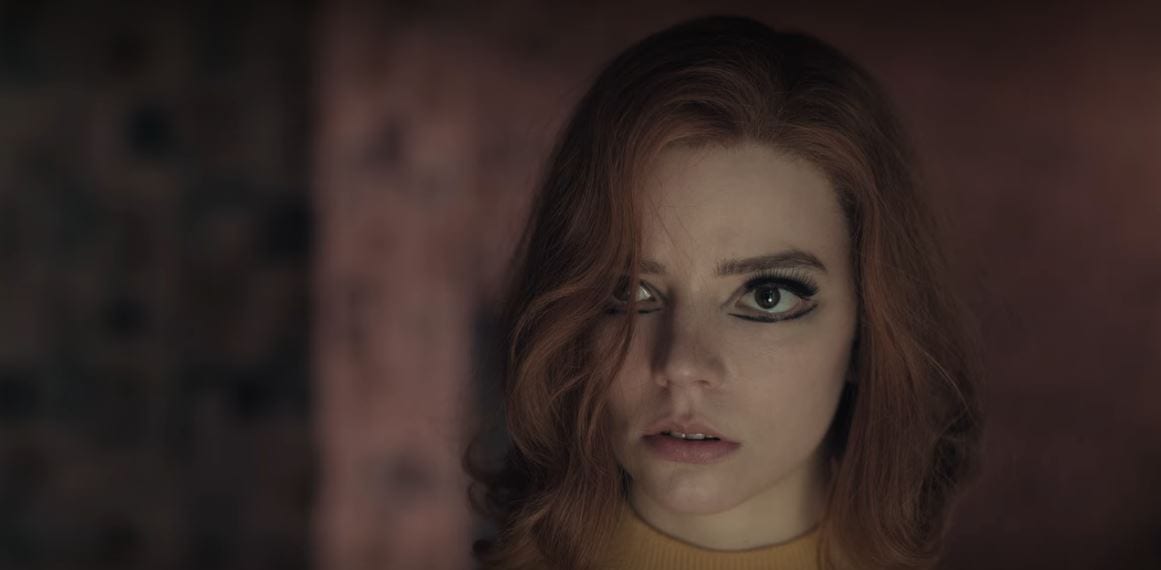
The important thing to grasp is how realistic this all is. The Queen’s Gambit offers a stark entry into the structure of addiction, particularly in Episode 6 as Beth travels down this spiral. There is shame at play, of course, but it is precisely shame about who she is rather than guilt about what she has done. Guilt, or regret, might lead you to apologize, reform or to vow never to make the same mistake again. This is not what Beth grapples with. No, her albatross is a shame at who she is. It cuts back to that trailer she grew up in and across her feelings of abandonment. Surely if she was unloved, there must have been a reason…perhaps that she is unlovable?
She can neither love herself nor forgive herself. To hide from the shame she sedates herself and if she feels shame at being a drunk she drinks again to dull the pain. And what brings her out of it—what always brings her out of it if anything does—is another person. Jolene arrives to her door.
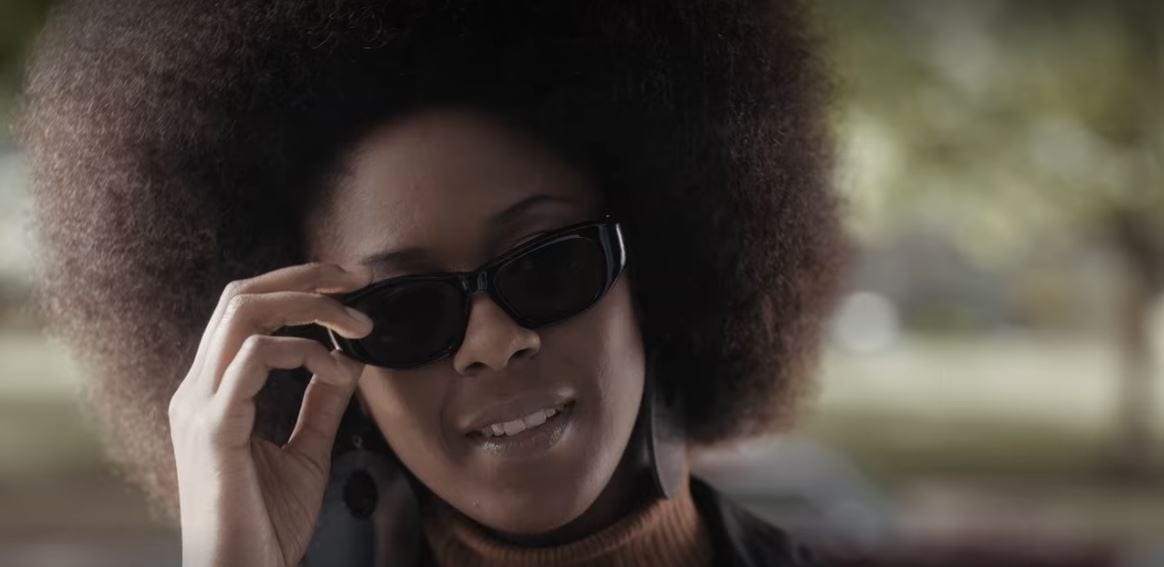
F*ck ‘Em If They Can’t Take a Joke
It is easy to view the orphan story with pity, but this misses the fact that it is the orphan who represents the default position, or the universal human condition. No one deserves to have parents who love them. That is, love is not something owed; it is a gift. Everyone knows this and yet we can all too easily fall prey, like the proverbial “nice guy,” to thinking of love in terms of debt.
The truth of the matter is brought out more starkly through a situation like Beth’s. Consider her adoptive parents. Allston doesn’t want her, just like any given father might not have wanted a child. And while Alma does, she doesn’t really know how to do it, trapped as she has been in her own circumstances. But ultimately she tries. And ultimately she does well, even if she enables Beth’s drug use and feeds what will become her alcoholism. She does well at loving Beth, or at least, she does the best she can.
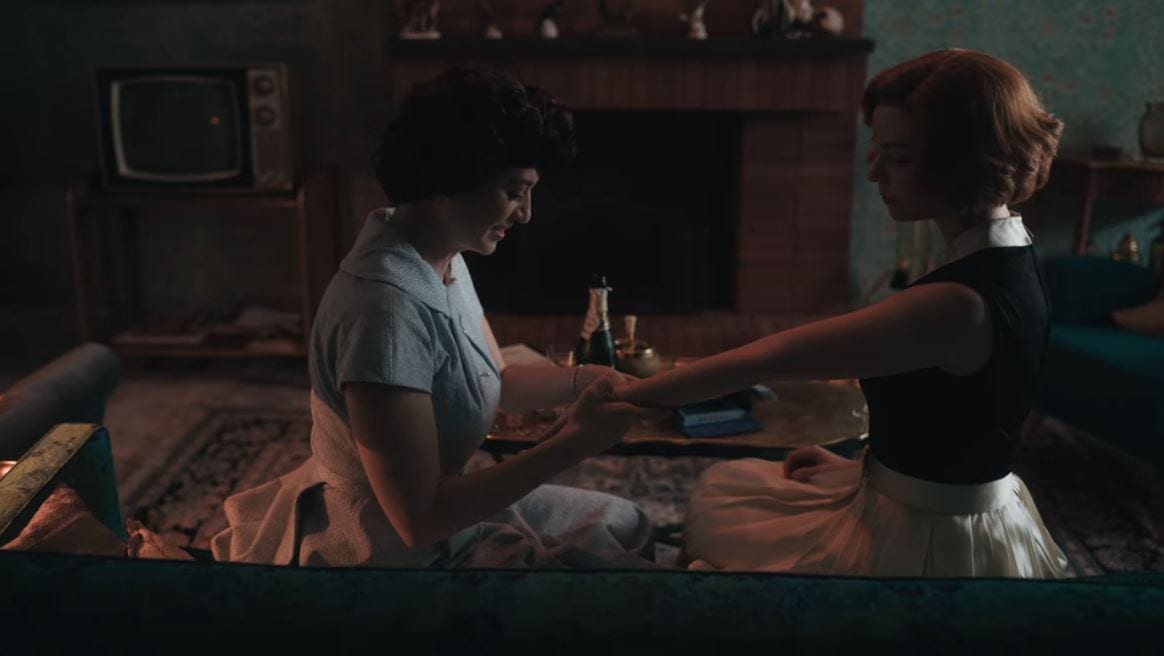
We are, each of us, in principle orphans. We are in principle alone in this ocean of chaos. Sartre calls it abandonment—God is dead. But God is not just God, but the Father and the source of the Law—a symbol with no concrete content, as your real father is always Allston, or Paul, or might happen to be a human being who truly loves and cares for you. But it is not the orphan who is lacking so much as it is the loved child who’s received something special, as human beings who don’t know what they’re doing make more human beings who of course don’t know either.
Yet it is hard to approach all of this without judgment, whether it is of Beth’s mother, or her adoptive father, or Beth herself as she risks drinking away her future. But that’s what love is: an approach without judgment. It isn’t Harry Beltik accosting Beth in order to tell her she needs to get herself together because she’s destroying her life. He’s right, but that’s not the point. This doesn’t work. The problem isn’t that he doesn’t care, but that he can only frame things through the lens of debt—Beth owes it to herself to stop drinking.
In contrast Jolene is simply there for Beth. She loves her no matter what. As did Mr. Shaibel. And I don’t mean to excuse Beth’s behavior through all of this. It’s heart-wrenching that she never sent Shaibel the ten dollars she promised, not because of the money involved but because she didn’t tend to that relationship. He’d sent her the money for her to enter her first tournament. He believed in her and tracked her career, as evidenced by the posting on the wall of the boiler room. Jolene may laugh but Beth is right to feel bad about the fact that she owed him money when he died. Presumably that letter she sent him was the last he ever heard from her.
Addiction has a way of wrecking relationships and if I suggest approaching Beth with love this is not to excuse her faults. Forgiveness is a very different thing. Beth is lucky to have found those like Jolene, Shaibel, and Alma who love her faults and all. She’s lucky to have Benny, Beltik, Townes, Matt, Mike et al. rally to her cause to help her win in Moscow. The point is that we are all lucky for those we likewise have in our lives, because even if we’re in principle alone we can’t live that way. Radical individualism and the desire for control are the real stumbling blocks—Beth’s drinking is just a symptom.
But so this is the real triumph The Queen’s Gambit ends on. It’s not Beth’s victory over Borgov so much as the connection she finds with others, or allows herself to have with others. Underneath this there is an acceptance of what she cannot control, and we even see her relationship with chess shift in the closing frames as she sits down to play with a Russian on the street.
Let’s play, because this is a game after all, and perhaps life is best viewed as one too.
Yet it is a very plain and elementary truth, that the life, the fortune, and the happiness of every one of us, and, more or less, of those who are connected with us, do depend upon our knowing something of the rules of a game infinitely more difficult and complicated than chess. It is a game which has been played for untold ages, every man and woman of us being one of the two players in a game of his or her own. The chess-board is the world, the pieces are the phenomena of the universe, the rules of the game are what we call the laws of Nature. The player on the other side is hidden from us. We know that his play is always fair, just and patient. But also we know, to our cost, that he never overlooks a mistake, or makes the smallest allowance for ignorance. To the man who plays well, the highest stakes are paid, with that sort of overflowing generosity with which the strong shows delight in strength. And one who plays ill is checkmated—without haste, but without remorse. – Thomas Henry Huxley, A Liberal Education and Where to Find It (1868)

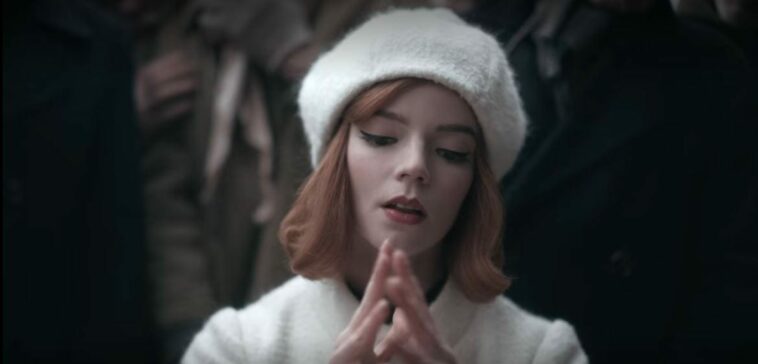
Terrific show, I was so glad I watched it.